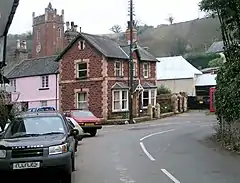Combeinteignhead
Combeinteignhead or Combe-in-Teignhead is a village in Teignbridge, South Devon, England. It lies within the civil parish of Haccombe with Combe, between Newton Abbot and Shaldon, about half a mile (1 km) inland from the estuary of the River Teign.
| Combeinteignhead | |
|---|---|
 Combeinteignhead | |
| Population | 729 (Haccombe with Combe parish) (2001 Census) |
| OS grid reference | SX902716 |
| District | |
| Shire county | |
| Region | |
| Country | England |
| Sovereign state | United Kingdom |
| Post town | Newton Abbot |
| Postcode district | TQ12 |
| Dialling code | 01626 |
| Police | Devon and Cornwall |
| Fire | Devon and Somerset |
| Ambulance | South Western |
| UK Parliament | |
Despite this closeness to the River Teign, the name Combeinteignhead is not derived from it: in the Domesday Book the district contained thirteen manors which totalled an area of ten hides and the whole area was known as the "Ten Hide". This was later corrupted to Teignhead through the influence of the river name. It is one of the longest place names in England, with 16 letters. The name of the nearby village of Stokeinteignhead has a similar derivation.[1]
The village has two historic pubs: the Wild Goose Inn, originally called the Country House Inn, a 17th-century tavern in the centre of the village, and the Coombe Cellars Inn, right on the estuary of the River Teign. Coombe Cellars was an early base for the local fishing industry and was also used by smugglers.[2]
The village church (dedicated to All Saints) has ancient origins: Bishop Bronescombe dedicated two altars here in 1259, and the high altar was dedicated in 1339. The present building dates from the 14th and 15th centuries; it was restored in the 1880s, but retains its 12th century font.[2] Henry de Bracton was rector here for a short time in the 13th century.[3] The pews have fascinating carved bench ends dating from Elizabethan times. These include many well known and obscure saints as well as wild men, animals, St George in armour spearing a dog-like dragon, and some depictions that are difficult to identify. They may be the finest wood carvings in Devon.[4]
The nearby almshouses built of red sandstone were founded in 1620 by William Bourchin.[2]
Combeinteignhead was designated as a conservation area in December 2000.[5]
References
- Gover, J.E.B., Mawer, A. & Stenton, F.M. (1931). The Place-Names of Devon. English Place-Names Society. Vol viii. Part II. Cambridge University Press. P.459.
- Harris, Helen (2004). A Handbook of Devon Parishes. Tiverton: Halsgrove. p. 76. ISBN 1-84114-314-6.
- "Bratton [Bracton], Henry of (d. 1268)". Oxford Dictionary of National Biography (online ed.). Oxford University Press. doi:10.1093/ref:odnb/3163. (Subscription or UK public library membership required.)
- Hilary Bradt (2014). South Devon & Dartmoor (Slow Travel). Bradt Travel Guides. pp. 38–39. ISBN 978-1-84162-552-2.
- "Conservation Area | Haccombe With Combe". haccombewithcombe.co.uk. Retrieved 12 December 2020.
External links
![]() Media related to Combeinteignhead at Wikimedia Commons
Media related to Combeinteignhead at Wikimedia Commons